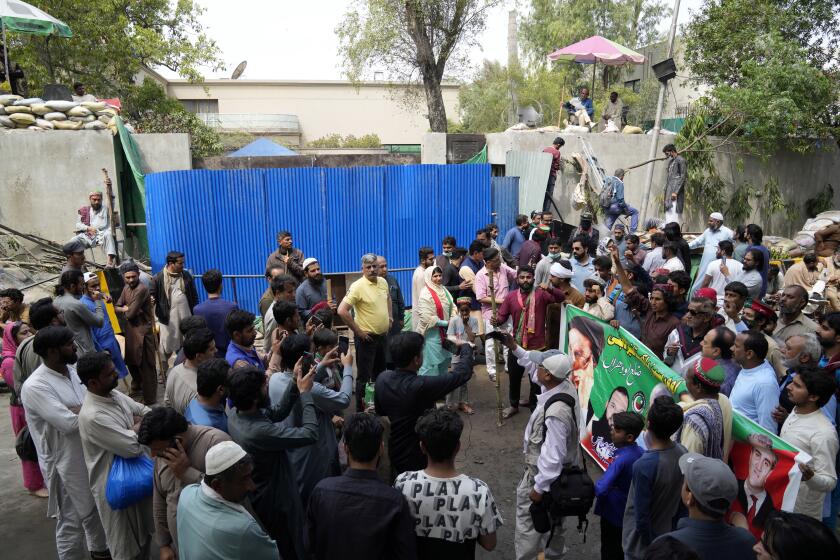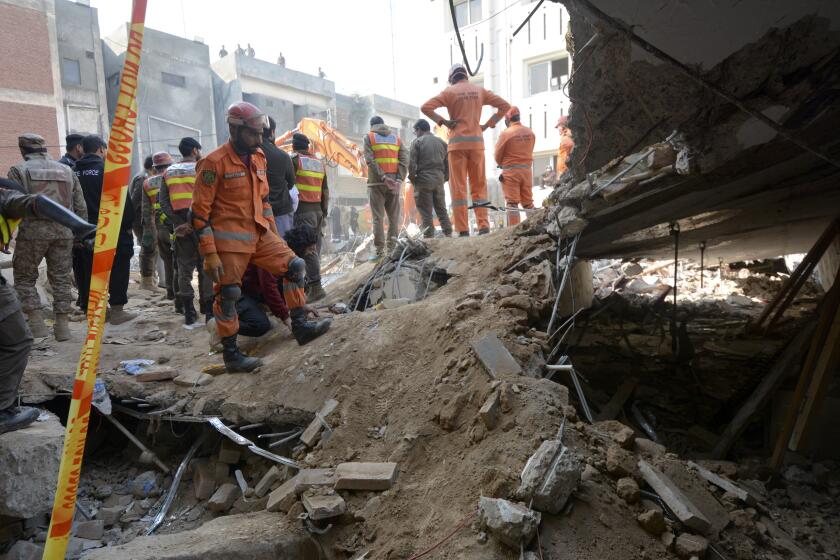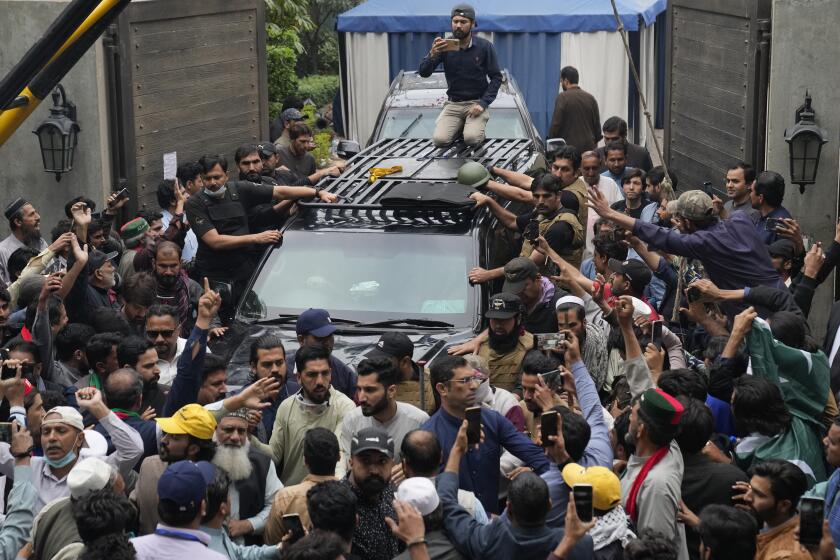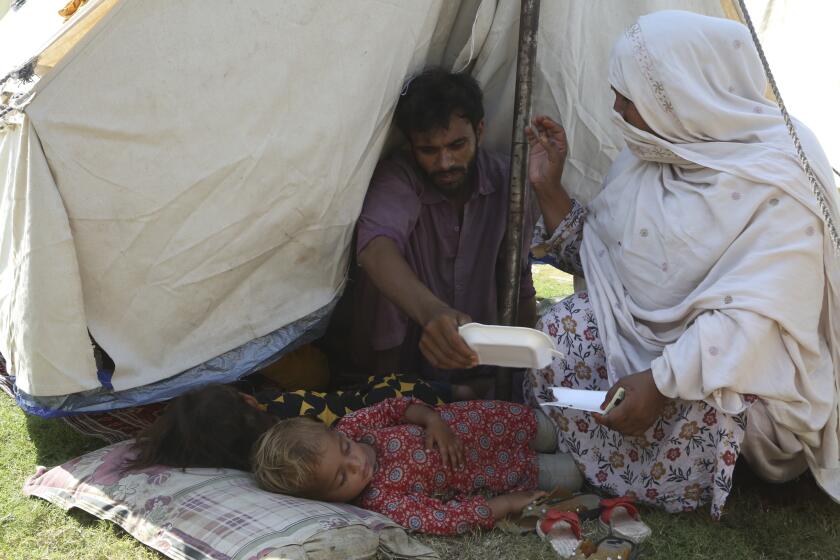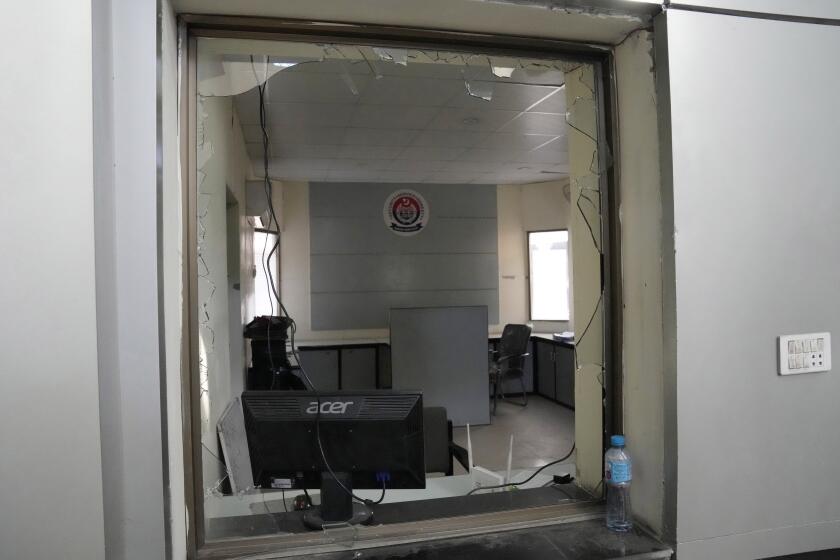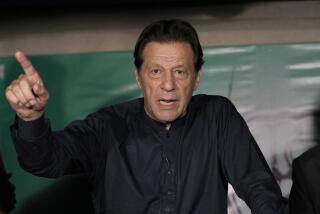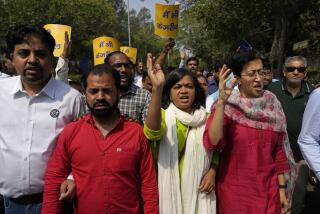Former Pakistani Prime Minister Imran Khan is arrested, sparking violent protests
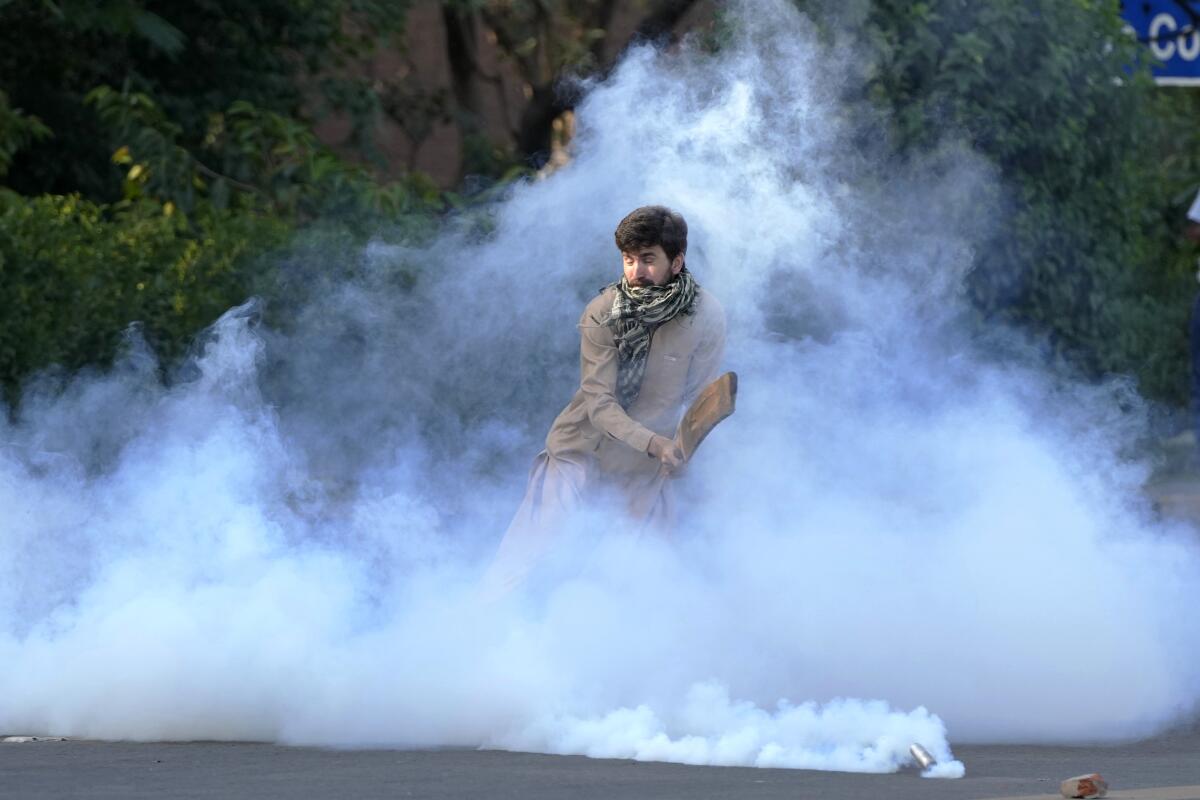
ISLAMABAD, Pakistan — Former Pakistani Prime Minister Imran Khan was arrested and dragged from court Tuesday as he appeared to face charges in multiple graft cases — a dramatic escalation of political tensions that sparked violent demonstrations by his supporters in almost all of the country’s major cities.
The detention of Khan, who was ousted in a no-confidence vote in April 2022 but remains the leading opposition figure, represents the latest confrontation to roil Pakistan, which has seen former prime ministers arrested over the years and interventions by its powerful military.
He was removed from the Islamabad High Court by security agents from the National Accountability Bureau, loaded into an armored car and whisked away, according to Fawad Chaudhry, a senior official with Khan’s Pakistan Tehreek-e-Insaf Party.
For the record:
4:12 a.m. May 10, 2023A previous version of this story gave an incorrect age for former Pakistani Prime Minister Imran Khan. He is 70, not 71.
Chaudhry denounced the arrest of the 70-year-old former cricket star as “an abduction.” Pakistan’s independent GEO TV broadcast video of Khan being taken away surrounded by his angry supporters.
After Khan was removed, a scuffle broke out between his supporters and police. Chaudhry said some of Khan’s lawyers and supporters were injured in the scuffle, as were several officers.
Khan’s party immediately complained to the Islamabad High Court, which requested a police report explaining the charges in his arrest.
Khan was later moved to the garrison city of Rawalpindi, near Islamabad, for questioning by the National Accountability Bureau, police and government officials said. He was also to undergo a routine medical checkup, police said.
Police have filed charges against ex-Prime Minister Imran Khan, 17 of his aides and scores of supporters, accusing them of terrorism and other offenses.
Khan had arrived in Islamabad from the nearby city of Lahore, where he resides, to face the graft charges.
He has denounced the cases against him, which include terrorism charges, as a politically motivated plot by his successor, Prime Minister Shahbaz Sharif, saying his ouster was illegal and a Western conspiracy. Khan has campaigned against Sharif and demanded early elections.
Tuesday’s arrest was based on a new warrant from the National Accountability Bureau, obtained last week in a separate graft case for which Khan had not been granted bail, making him vulnerable to being seized. His lawyers have challenged the legality of the arrest. He is scheduled to appear at an anti-graft tribunal Wednesday, officials said.
“Imran Khan has been arrested because he was being sought in a graft case,” Interior Minister Rana Sanaullah Khan told a news conference. He alleged that Pakistan’s treasury had lost millions of dollars while Khan was in office because of illegal purchases of land from a business tycoon.
The suicide attack that killed 100 people in a Sunni mosque in Peshawar was one of the deadliest targeting Pakistani security forces in recent years.
At a news conference, Law Minister Azam Nazeer Tarar said Khan was arrested because he was not cooperating with the investigations. He denounced the violence by Khan’s supporters, saying protests must remain peaceful.
“It should have not happened,” he said shortly after TV video emerged of burning vehicles and damaged public property.
Authorities said they have banned rallies in the eastern province of Punjab.
As news of Khan’s arrest spread, about 4,000 of his supporters stormed the official residence of the top regional commander in Lahore, smashing windows and doors, damaging furniture and staging a sit-in as troops there retreated to avoid violence. The protesters also burned police vehicles and blocked key roads.
Police moved to remove encroachments and a blockade erected in Lahore by Imran Khan’s Tehreek-e-Insaf party and his defiant supporters.
Protesters smashed the main gate of the army’s headquarters in Rawalpindi, where troops exercised restraint. Hundreds of demonstrators shouted
pro-Khan slogans as they moved toward the sprawling building.
In the port city of Karachi, police swung batons and fired tear gas to disperse hundreds of Khan supporters who had blocked a major road.
Khan’s arrest was “blatant interference in the judicial affairs by the powers that be,” Raoof Hasan, another leader from Khan’s party, told Al Jazeera English television. “We are completely in the dark. He was virtually abducted from the court of law.”
Khan’s arrest came hours after he issued a video message before heading to Islamabad, saying he was “mentally prepared” for arrest there.
Start your day right
Sign up for Essential California for the L.A. Times biggest news, features and recommendations in your inbox six days a week.
You may occasionally receive promotional content from the Los Angeles Times.
Khan, who was wounded by a shooter during a rally in November — an attack that killed one of his supporters and wounded 13 — has insisted, without offering any evidence, that there is a plot to kill him and has alleged that Pakistan’s spy agency was behind the conspiracy to assassinate him.
The gunman in that attack was immediately arrested; police later released a video of him in custody allegedly saying he had acted alone.
On Monday, the military in a statement criticized Khan for “fabricated and malicious allegations” of its involvement in the November shooting, saying the accusations were “extremely unfortunate, deplorable and unacceptable.”
The military has directly ruled Pakistan for more than half of the 75 years since the country gained independence from British colonial rule and wields considerable power over civilian governments.
Pakistani flood survivors recount how the surging waters were like nothing they had ever seen before, striking their homes swiftly and brutally.
Sharif, whose government is facing a spiraling economy and is struggling to recover from flooding last year that killed hundreds and caused $30 billion in damage, slammed Khan for assailing the military.
“Let this be abundantly clear that you, as former prime minister, currently on trial for corruption, are claiming legitimacy to overturn the legal and political system,” Sharif tweeted.
In a statement, the European Union urged “restraint and cool-headedness” in Pakistan through dialogue and the rule of law.
Khan is the seventh former prime minister to be arrested. Zulfikar Ali Bhutto was arrested and hanged in 1979. The current prime minister’s brother, Nawaz Sharif, who also served as premier, was arrested on several occasions on suspicion of corruption.
Pakistani police arrest at least 50 suspects in the mob lynching of a man who was in custody on suspicion of committing blasphemy against Islam.
In March, police stormed Khan’s Lahore residence, seeking to arrest him based on a court order in a different case. Dozens, including police officers, were injured in ensuing clashes. Khan was not arrested at the time.
Khan came to power in 2018 after his party won parliamentary elections.
More to Read
Sign up for Essential California
The most important California stories and recommendations in your inbox every morning.
You may occasionally receive promotional content from the Los Angeles Times.
